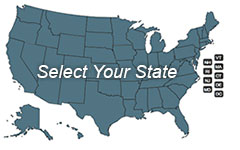Mental Health Counselor License in Hawaii

Hawaii’s mental health counselors are licensed by Hawaii Professional and Vocational Licensing (PVL) as Licensed Mental Health Counselors (LMHC). The license is specific to mental health counseling and is not issued to vocational or developmental counselors unless they simultaneously practice mental health counseling. It is granted on the basis of graduate level education, examination, and supervised practice.
- Featured Online CACREP Accredited Master's in Counseling Program Options:
- Liberty University, a non-profit university, offers a CACREP accredited online Master of Arts in Clinical Mental Health Counseling. Click here to learn more about Liberty University and their Master of Arts in Clinical Mental Health Counseling.
- Prepare for counseling licensure in as few as 27 months with Pepperdine’s online MA in Clinical Psychology - no GRE required. The program is top ranked for return on investment (ROI) by OnlineU.
- Southern New Hampshire University (SNHU) offers a CACREP accredited online BA in Psychology - Mental Health. Click here to learn about the counseling programs at SNHU.
- Grand Canyon University offers an M.S. in Clinical Mental Health Counseling with an Emphasis in Childhood and Adolescence Disorders; Christian Counseling; Marriage & Family Therapy and Trauma.
- Sacred Heart University's Master of Arts in Clinical Mental Health Counseling is offered online and was developed based off CACREP standards to prepare graduates for licensure in most states. Click here to learn more about Sacred Heart University and the online Master of Arts in Clinical Mental Health Counseling.
Select a Hawaii Mental Health Counselor Licensure Topic:
- Licensed Professional Counselor Education Requirements
- Required Examination
- Supervision Requirements
- Application Process
- Out-of-State Mental Health Counselors
- Contacts and Additional Information
Educational Requirements
An individual can be licensed as a mental health counselor with either a master’s or doctoral degree from a regionally accredited college or university (http://hawaii.gov/dcca/pvl/programs/mental/statute_rules). Hawaii PVL will accept degrees in mental health counseling and other related fields. The program must comprise at least 48 graduate semester hours.
The student will need three semester hours in each of the following:
- Counseling theories and application
- Human growth and development
- Cultural and social foundations
- Behavioral appraisal
- Career and lifestyle development
- Group theories and practice
- Tests and measurement
- Ethics and professional orientation
- Research and program evaluation
Human growth and development coursework is to include personality and learning theories as well as behavioral factors such as environment, disability, and crisis. Appraisal coursework is to include DSM-based diagnosis. A full description of content that is to be covered can be found in 453D-7 of Hawaii’s mental health counselor rules (http://hawaii.gov/dcca/pvl/programs/mental/statute_rules).
It is acceptable for some coursework to be completed post-degree. Five quarter hours will be accepted as the equivalent of three semester hours.
The student will need to complete a minimum of two semesters of practicum, each comprised of at least three semester hours or five quarter hours. Practicum experience must include at least 300 hours of client contact, carried out in mental health settings. The work may be supervised by a mental health counselor or another licensed mental health professional. Supervision by a psychiatrist, psychologist, marriage and family therapist, or clinical social worker is acceptable, as is supervision by an advanced practice nurse who specializes in mental health.
Examination Requirement
Hawaii requires candidates to pass the National Counselor Examination for Licensure and Certification, or NCE. Students enrolled in counseling programs that are accredited by the Council for Accreditation of Counseling and Related Education Programs (CACREP) typically have the opportunity to test during their final terms. Hawaii candidates who do not test as students will not be authorized to do so until they have completed all other licensing requirements and submitted applications.
An approved candidate will receive registration materials in the mail. The completed registration will be sent to the National Board for Certified Counselors (NBCC). The NBCC typically takes four weeks to process materials and notify candidates. At this point, candidates are allowed to schedule their own computerized examinations. Examinations are typically offered two weeks out of each month. There is one testing site in Hawaii, in Honolulu. Candidates may, however, opt for AMP testing sites in other states (http://www.nbcc.org/directory/HI).
The fee is currently $195. Fee payment grants a six month testing window. Candidates should be aware that slots may fill.
A candidate who does not pass is allowed to retest after a three-month wait period. Re-examination will require payment of another $195 fee.
A candidate who has already passed the examination will request official verification to be sent straight from the NBCC to the licensing agency.
Supervised Practice Requirements
Hawaii’s prospective mental health counselors must work under supervision for at least two years and until such time as they have accrued 3,000 hours of post-graduate mental health counseling experience. They may take up to four years to accrue the hours.
Supervision will be provided by a qualified, licensed mental health professional. Again, this may be a mental health counselor, clinical social worker, marriage and family therapist, psychologist, psychiatrist or advanced practice nurse. At least 100 hours of direct clinical supervision must be provided.
The Application Process
Applications can be downloaded from the PVL website (http://hawaii.gov/dcca/pvl/programs/mental/application_publication). Transcripts are to be sent directly from the issuing institution(s); PVL will require a transcript from all schools where license-qualifying coursework was taken. The candidate will fill out a coursework form and attach syllabi.
Practicum and post-graduate supervisors will fill out verification forms and have them notarized.
A candidate with a criminal background will need to include a detailed written statement, court documents, and, if applicable, information about probation or parole terms and compliance.
The application fee is $60. The license fee will be assessed later. (It ranges from $210 to $364, depending on the stage of the three-year renewal cycle.)
Applications may be mailed or hand delivered to the PVL Licensing Branch in Honolulu. They are accepted year-round.
Out-of-State Mental Health Counselors
While the licensing agency reserves the right to enter into reciprocity agreements with other states, out-of-state counselors currently apply by the same method as other candidates: by showing that they meet education, supervision, and examination requirements.
A candidate who completed a qualifying degree before July 2007 can use alternate means to document practicum and post-graduate experience. A school official can document practicum on official letterhead. An agency officer and clinical supervisor can jointly certify that the candidate met experience requirements.
Additional Information
Mental health counselor license information, including application forms and applicable rules, is available on the site of Hawaii Professional and Vocational Licensing. The contact page lists phone numbers by island (http://hawaii.gov/dcca/pvl/programs/mental).
The Hawaii Counselors Association provides professional resources but does not issue licenses (http://hawaiicounselors.org/).
Find Mental Health Counselor Licensure Requirements in Your State:

Learn about becoming a Mental Health Counselor in your state:
To View Full U.S. Map Click Here.